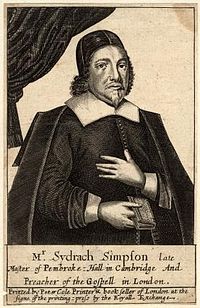Sidrach Simpson

Sidrach Simpson (c.1600-1655) was an English Independent minister, one of the leaders of the Independent faction in the Westminster Assembly.
Life
Sidrach Simpson came from Lincolnshire. He was educated as a sizar at Emmanuel College and Queens' College, Cambridge.[1]
After losing his Church of England status under William Laud, he spent time as a minister in the Netherlands. In the Westminster Assembly he was one of the "Five Dissenting Brethren" putting their names to the An Apologeticall Narration presented to Parliament on 3 January 1644. The others in the group were William Bridge, Jeremiah Burroughs, Thomas Goodwin and Philip Nye, all with a comparable Dutch background as ministers (Burroughs and Simpson both in Rotterdam[2]), and united in a form of Congregationalism[3][4] He was also in the group of ten, dominated by Independents, condemning in 1652 the Racovian Catechism, with Nye and Bridge, six further Independents,[5] John Dury, and Adoniram Byfield.[6]
He became Master of Pembroke Hall, Cambridge in 1650, but was drifting in his last years to the outer extremes in his positions.[citation needed] He was preoccupied with his concurrent post as rector in London, at St Mary Abchurch, and then from 1653 at St Bartholomew-by-the-Exchange.[7][8] Oliver Cromwell had him imprisoned for aggressive preaching.[8]
Notes
- ^ "Simpson, Sidrach (SM616S)". A Cambridge Alumni Database. University of Cambridge.
- ^ "Jeremiah Burroughs (c. 1600-1646) by Dr. Joel Beeke and Randall J. Pederson".
- ^ Michael R. Watts, The Dissenters (1978), pp. 99-100.
- ^ "Lev_mov.HTM". Archived from the original on 20 November 2008. Retrieved 21 October 2008.
- ^ Namely John Owen, William Strong, William Bridge, William Greenhill, George Griffith, and Thomas Harrison.
- ^ "Statesman2". Archived from the original on 9 September 2007. Retrieved 12 July 2007.
- ^ "The colleges and halls: Pembroke - British History Online".
- ^ a b Concise Dictionary of National Biography
